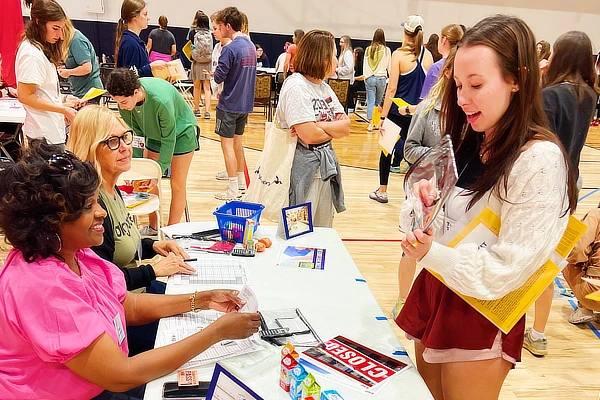
On Oct. 24, students from Samford’s Micah Fellows program, School of Public Health and Orlean Beeson School of Education came together to engage in a unique instructional exercise known as a poverty simulation.
“Don't be misled by the name,” said Kate Scarborough, assistant professor of teacher education. “We are not attempting to, nor can we, replicate the exact conditions of poverty. Instead, we aim to expose our students to new perspectives and engage in exercises that foster empathy.”
During the poverty simulation, students received packets describing problem-based family scenarios they needed to navigate within a fictional one-month timeframe. Their task was to grapple with various situations mirroring the challenges faced by families across the United States on a daily basis.
In several scenarios, students were faced with the difficulty of finding adequate transportation to their jobs or schools. Others faced challenges like a health crisis or the death of a relative that introduced unexpected financial difficulty into their life. Some students became victims of crimes that affected their finances.
All students had to navigate these trials while still supporting their families, prioritizing needs for education, health care and transportation. Limited access to these commodities is often one of the largest contributors to the conditions of poverty.
Scarborough noted, “The proportion of people who believe that poverty results from laziness is remarkably high. The class our students are enrolled in is named 'diverse learners,' and it focuses on instructing future teachers on how to interact with all students, regardless of their family dynamics and socioeconomic status.”
For some children, status symbols such as footwear and clothing, as well as parental involvement or its absence in school systems and communities, can shape negative perceptions and cultivate misleading narratives about low-income families. The poverty simulation is tailored to confront implicit biases surrounding wealth and community involvement, with the intention of equipping Samford students as informed and compassionate professionals.
Susannah Swicegood has chosen to major in the School of Education's Human Development and Family Science program. She believes exercises like the poverty simulation will prepare her to pursue her calling to help her community.
"I believe this exercise enhances our ability to relate to others," said Swicegood. "The most practical application is empathy. In our classes, we consistently emphasize that we cannot truly understand and empathize with others until we place ourselves in their shoes."
The event gave students from across campus the chance to collaborate through an innovative teaching method that impacts not only the mind but also the heart, nurturing impactful careers in the service of others.
Swicegood added, "Since we typically occupy separate areas of the campus, opportunities to collaborate with the School of Public Health are rare. Many of these majors fall under the category of 'helping professions,' which aligns with my life's calling—to help others. So, I believe this collaborative opportunity is shaping well-rounded students who, in turn, will leave Samford and make a positive impact on our communities."
